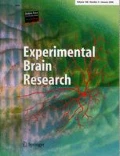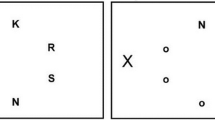Abstract
A strong assumption shared by major theoretical approaches to cognition posits that the human cognitive system has a limited capacity for information processing. Evidence supporting this claim comes from the dual-task paradigm in which one cognitive system has to process two tasks simultaneously. In this study, we examined whether bottleneck-like processing can also be elicited when a dual task is shared between two individuals. Under dual-task instructions giving priority to Task 1, we found evidence of a psychological refractory period effect in dual-task and joint-task conditions. Under equal priority instructions, we replicated the finding of a psychological refractory period effect in the dual-task, but not in the joint-task condition. These findings are in line with the assumption that a social psychological refractory period effect can be induced across two individuals. We suggest that this effect is due to task-specific monitoring requirements. We discuss our findings with respect to both dual-task and joint action theories.




Similar content being viewed by others
References
Atmaca S, Sebanz N, Prinz W, Knoblich G (2008) Action co-representation: the joint SNARC effect. Soc Neurosci 3:410–420
Beringer J (2000) Experimental runtime system. BeriSoft Cooperation, Frankfurt am Main, 1987–2000
Brass M, Bekkering H, Wohlschläger A, Prinz W (2000) Compatibility between observed and executed finger movements: comparing symbolic, spatial, and imitative cues. Brain Cogn 44:124–143
De Jong R, Liang CC, Lauber E (1994) Conditional and unconditional automaticity: a dual-process model of effects of spatial stimulus-response correspondence. J Exp Psychol Human 20:731–750
Dehaene S (1992) Varieties of numerical abilities. Cognition 44:1–42
Eriksen CW, Schultz DW (1979) Information processing in visual search: a continuous flow conception and experimental results. Percept Psychophys 25:249–263
Howes A, Lewis RL, Vera AH (2009) Rational adaptation under task and processing constraints: implications for testing theories of cognition and action. Psychol Rev 116:717–751
James W (1890) The principles of psychology (vols l–2). Holt, New York
Liepelt R, von Cramon DY, Brass M (2008) What is matched in direct matching? Intention attribution modulates motor priming. J Exp Psychol Human 34:578–591
Liepelt R, Fischer R, Frensch PA, Schubert T (2011) Practice-related reduction of dual-task costs under conditions of a manual-pedal response combination. J Cogn Psychol 23:29–44
Liepelt R, Strobach T, Frensch P, Schubert T (in pressa) Improved inter-task coordination skills after extensive dual-task practice. Q J Exp Psychol
Liepelt R, Wenke D, Fischer R, Prinz W (in pressb) Trial-to-trial sequential dependencies in a social and non-social Simon task. Psychol Res
Meyer DE, Kieras DE (1997a) A computational theory of executive cognitive processes and multiple-task performance: part 1. Basic mechanisms. Psychol Rev 104:3–65
Meyer DE, Kieras DE (1997b) A computational theory of executive cognitive processes and multiple-task performance: part 2. Accounts of psychological refractory-period phenomena. Psychol Rev 104:749–791
Meyer DE, Kieras DE (1999) Précis to a practical unified theory of cognition and action: some lessons from EPIC computational models of human multiple-task performance. In: Gropher D, Koriat A (eds) Attention and performance XVII. Cognitive regulation of performance: interaction of theory and application. MIT Press, Cambridge, pp 17–88
Pashler H (1984) Processing stages in overlapping tasks: evidence for a central bottleneck. J Exp Psychol Human 10:358–377
Pashler H (1994) Dual-task interference in simple tasks: data and theory. Psychol Bull 116:220–244
Pashler H, Johnston JC (1989) Chronometric evidence for central postponement in temporally overlapping tasks. Q J Exp Psychol 41A:19–45
Prinz W (1997) Perception and action planning. Eur J Cogn Psychol 9:129–154
Schumacher EH, Seymour TL, Glass J, Lauber EH, Kieras DE, Meyer DE (2001) Virtually perfect time-sharing in dual-task performance: uncorking the central cognitive bottleneck. Psychol Sci 121:101–108
Sebanz N, Knoblich G, Prinz W (2003) Representing others’ actions: just like one’s own? Cognition 8:B11–B21
Sebanz N, Knoblich G, Prinz W (2005) How two share a task: corepresenting stimulus-response mappings. J Exp Psychol Human 6:1234–1246
Telford CW (1931) The refractory phase of voluntary and associative responses. J Exp Psychol 14:1–36
Vlainic E, Liepelt R, Colzato LS, Prinz W, Hommel B (2010) The virtual co-actor: the Social Simon effect does not rely on online feedback from the other. Front Cogn 1:1–6
Welford AT (1952) The “psychological refractory period” and the timing of high speed performance. Br J Psychol 43:2–19
Acknowledgments
The authors wish to thank Patricia Grocke for help with data acquisition.
Conflict of interest
The authors declare that they have no conflict of interest.
Author information
Authors and Affiliations
Corresponding author
Rights and permissions
About this article
Cite this article
Liepelt, R., Prinz, W. How two share two tasks: evidence of a social psychological refractory period effect. Exp Brain Res 211, 387–396 (2011). https://doi.org/10.1007/s00221-011-2703-2
Received:
Accepted:
Published:
Issue Date:
DOI: https://doi.org/10.1007/s00221-011-2703-2




